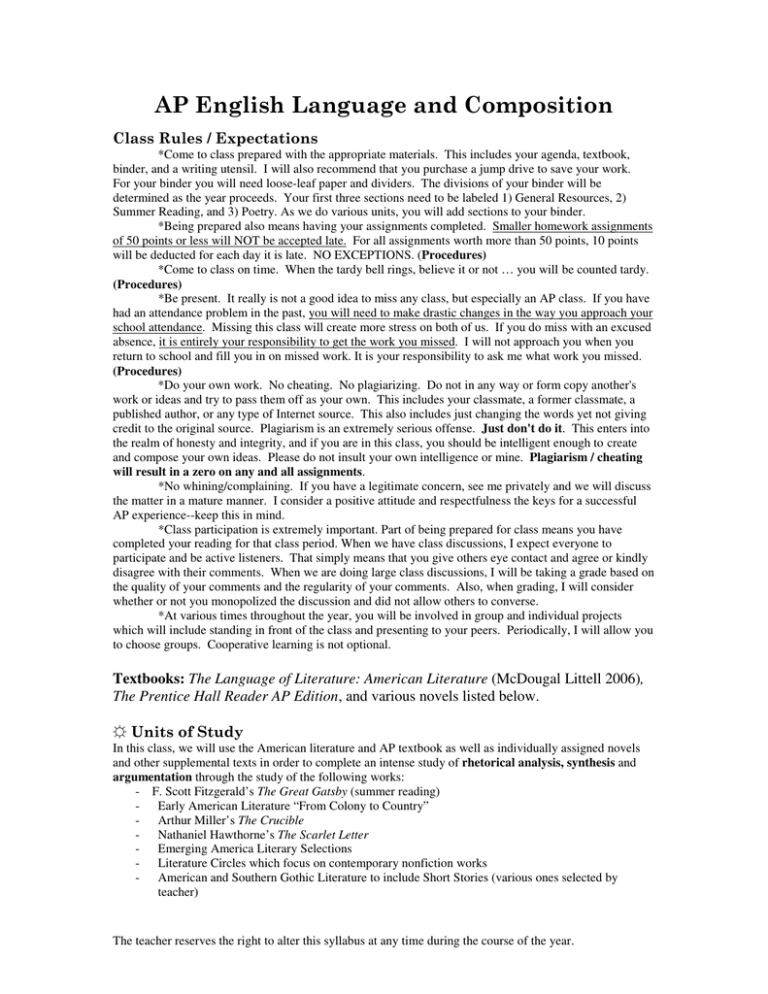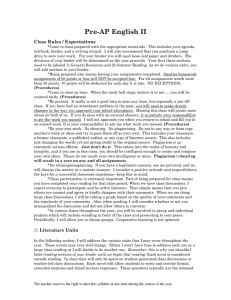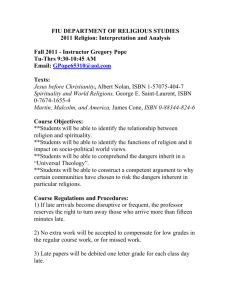AP English Language and Composition Class Rules / Expectations
advertisement

AP English Language and Composition Class Rules / Expectations *Come to class prepared with the appropriate materials. This includes your agenda, textbook, binder, and a writing utensil. I will also recommend that you purchase a jump drive to save your work. For your binder you will need loose-leaf paper and dividers. The divisions of your binder will be determined as the year proceeds. Your first three sections need to be labeled 1) General Resources, 2) Summer Reading, and 3) Poetry. As we do various units, you will add sections to your binder. *Being prepared also means having your assignments completed. Smaller homework assignments of 50 points or less will NOT be accepted late. For all assignments worth more than 50 points, 10 points will be deducted for each day it is late. NO EXCEPTIONS. (Procedures) *Come to class on time. When the tardy bell rings, believe it or not … you will be counted tardy. (Procedures) *Be present. It really is not a good idea to miss any class, but especially an AP class. If you have had an attendance problem in the past, you will need to make drastic changes in the way you approach your school attendance. Missing this class will create more stress on both of us. If you do miss with an excused absence, it is entirely your responsibility to get the work you missed. I will not approach you when you return to school and fill you in on missed work. It is your responsibility to ask me what work you missed. (Procedures) *Do your own work. No cheating. No plagiarizing. Do not in any way or form copy another's work or ideas and try to pass them off as your own. This includes your classmate, a former classmate, a published author, or any type of Internet source. This also includes just changing the words yet not giving credit to the original source. Plagiarism is an extremely serious offense. Just don't do it. This enters into the realm of honesty and integrity, and if you are in this class, you should be intelligent enough to create and compose your own ideas. Please do not insult your own intelligence or mine. Plagiarism / cheating will result in a zero on any and all assignments. *No whining/complaining. If you have a legitimate concern, see me privately and we will discuss the matter in a mature manner. I consider a positive attitude and respectfulness the keys for a successful AP experience--keep this in mind. *Class participation is extremely important. Part of being prepared for class means you have completed your reading for that class period. When we have class discussions, I expect everyone to participate and be active listeners. That simply means that you give others eye contact and agree or kindly disagree with their comments. When we are doing large class discussions, I will be taking a grade based on the quality of your comments and the regularity of your comments. Also, when grading, I will consider whether or not you monopolized the discussion and did not allow others to converse. *At various times throughout the year, you will be involved in group and individual projects which will include standing in front of the class and presenting to your peers. Periodically, I will allow you to choose groups. Cooperative learning is not optional. Textbooks: The Language of Literature: American Literature (McDougal Littell 2006), The Prentice Hall Reader AP Edition, and various novels listed below. ☼ Units of Study In this class, we will use the American literature and AP textbook as well as individually assigned novels and other supplemental texts in order to complete an intense study of rhetorical analysis, synthesis and argumentation through the study of the following works: - F. Scott Fitzgerald’s The Great Gatsby (summer reading) - Early American Literature “From Colony to Country” - Arthur Miller’s The Crucible - Nathaniel Hawthorne’s The Scarlet Letter - Emerging America Literary Selections - Literature Circles which focus on contemporary nonfiction works - American and Southern Gothic Literature to include Short Stories (various ones selected by teacher) The teacher reserves the right to alter this syllabus at any time during the course of the year. - Historical speeches and documents from both primary and secondary sources Contemporary Essays organized by Rhetorical Modes (WKU ENG 100 syllabus and AP Text) Visual rhetoric resources (political cartoons, advertisements, photographs, etc) Grammar, diction, syntax and vocabulary study will also be utilized throughout the course. ☼ Presentations At various times throughout the year, students will be involved in group and individual projects which will include standing in front of the class and presenting their findings to their peers. Students are expected to present professionally. The speeches should be mostly memorized and they should always have visuals. Each assignment will have its own rubric. ☼ Writing Units Analytical writing / Essay writing -- Timed essays are an important part of any AP English course. These essays help prepare students for the exam they will be taking in May, as well as developing the students’ fluency as writers. A timed essay will be given the first week of school over the summer reading, The Great Gatsby regarding the American Dream, as a benchmark to assess student growth. After each timed essay, students will workshop their essays in teams and as a large group, and complete a self-reflection to set goals for improvement during the course. Documentation and Research writing -- Formal research projects will be used to ensure that students are able to evaluate, use, and properly cite in MLA format primary and secondary sources to develop his or her own argument on a particular topic. Students will read and evaluate several sources including criticism, and compose a paper in correct MLA format that includes the analysis and synthesis of ideas from an array of sources. Students will write an essay to their own original mock College Board synthesis prompt.. Definition Paper – Taken from chapter 8 in the textbook, a definition essay will be about a topic that each student chooses. The essay will explore not only the denotative definition of a word or concept but also the connotative meaning behind it. Writing to demonstrate learning/understanding -- During each unit, students will be asked to write informally and through exploration to demonstrate understanding of text. Assignments such as reading logs, journals, free writing, and annotation are included. AGAIN! *Plagiarism and Cheating: According to Webster’s dictionary, plagiarism is taking ideas from another and passing them off as one’s own. Do not compromise your integrity by cheating or copying information from another source. Plagiarism and academic dishonesty are serious offences. The academic work of a student is expected to be his/her own effort. Students must give the author(s) credit for any source material used. To represent ideas or interpretations taken from a source without giving credit is a flagrant act. To present a borrowed passage after having changed a few words, even if the source is cited, is also plagiarism. Students who commit any act of academic dishonesty will receive a failing grade in that portion of the course work. Acts of academic dishonesty will be reported to the administration. Some of this information came from the AP Course Audit Manual. ☼ Assigned Reading and Time Management As class time will be dedicated to discussion and instruction, students will be required to read works of fiction (short stories and novels) and non-fiction independently, which The teacher reserves the right to alter this syllabus at any time during the course of the year. means that you MUST read these assignments on your OWN time. Advance notice of lengthy reading assignments will be given. Time management and dividing lengthy reading assignments into manageable sections over multiple days will be your best choice; procrastination will be your worst enemy in this class. Most homework assignments in this course are geared to be read and will prepare you for in class essay writing and activities. ☼ Outside Reading Quarterly Projects Note: When assigned to read a book of your choice, you may not choose books that are also movies without teacher approval. First Nine Weeks: Non-fiction Panel Books Second Nine Weeks: Non-fiction Panel Books Third Nine Weeks: Columnist Project Fourth Nine Weeks: Whole Class Read ☼ AP Grading Scale 100 = 100 84=89 98-99=99 83=88 96-97= 98 82=87 94-95=97 81=86 92-93=96 80=85 90-91=95 79=84 89=94 78=83 88=93 77=82 87=92 76=81 86=91 75=80 85=90 No curve is applied to averages below 75. Point Breakdown: These are estimates but may not always be the case on every assignment. Tests = 100 points Writing Rough Drafts = 50 points Writing Final Drafts = 100 points Revision Grades = 30 points Quizzes = 50 or below Socratic Seminar = 60-100 points A rubric will accompany assignments in order to let you know what is required to earn a particular score. AP Exam: All students enrolled in this AP class are expected to take the AP exam on May 8, 2013. The cost per students will be 45.00. You can pay in full on AP Parent Night (to be scheduled in September) or pay monthly. All payments are to be made to Ellen Blevins. The teacher reserves the right to alter this syllabus at any time during the course of the year. ☼ Closing Thoughts As your AP teacher, I am excited about this year. Our possibilities are limitless and with your determination to better yourself academically, you will enjoy exponential growth as a young college student. Yes, I did say college student. Remember, this is a college-level class and my expectations align with such academic excellence. If you or your parents have any questions, please see me. I am available by email or phone. The teacher reserves the right to alter this syllabus at any time during the course of the year. Please return this page. Student Signature: ______________________________________________________ Parent/Guardian Signature: _______________________________________________ Your signature confirms that you agree with the above guidelines for your child’s class and will earn him/her 10 points of extra credit. You are also acknowledging that you have read the procedures for this class. Please feel free to contact me any time during the school year with questions, concerns, or to discuss your child’s progress. You may reach me at school until 3:30 each day at (270)651-6315 or by email at kelley.ross@barren.kyschools.us **If you have any questions about the class or syllabus, please contact Ms. Ross. Parent/Guardian Email Address: __________________________________________ The teacher reserves the right to alter this syllabus at any time during the course of the year.


![Submission 68 [doc]](http://s3.studylib.net/store/data/008000926_1-fed8eecce2c352250fd5345b7293db49-300x300.png)



